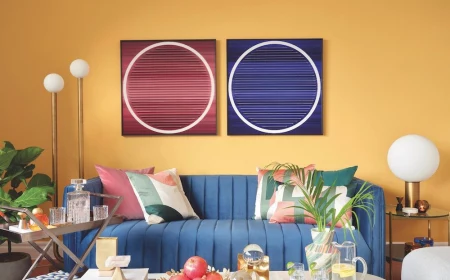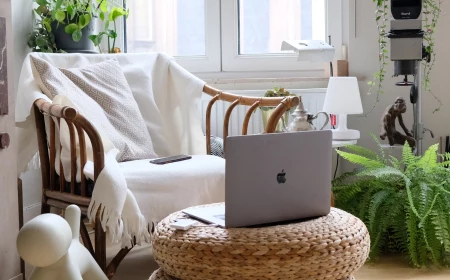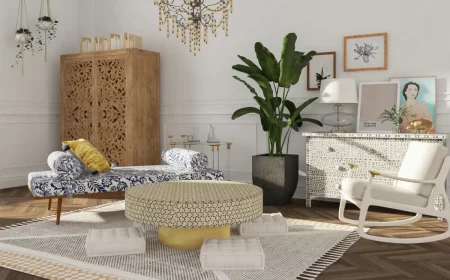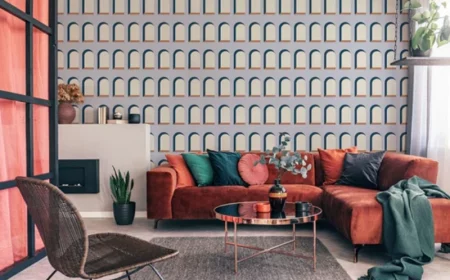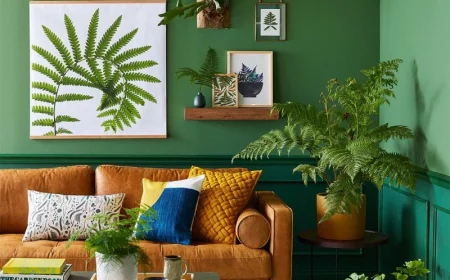The Real Foundation of a Modern Living Room (It’s Not What You Think)
So many people hear the word “modern” and immediately picture a cold, sterile white box. But honestly, that’s not it at all. I’ve seen clients bring in photos of everything from stark industrial lofts to cozy, textured Scandinavian rooms, all labeled ‘modern.’ And you know what? They’re all kind of right.
In this article
- First Things First: Your Designer’s Toolkit
- 1. Master Your Space (Before It Masters You)
- 2. Let There Be (Good) Light
- 3. Be Honest with Your Materials
- 4. Choosing Furniture That Lasts
- 5. Finding Your Modern Dialect
- 6. The Final Layer: Making It Yours
- 7. Know When to DIY and When to Call a Pro
- Inspirational Gallery
Here’s the thing: modern design isn’t a specific look you can just copy-paste into your home. It’s a philosophy. It’s all about clean lines, honest materials, and making sure your space actually works for your life. A truly modern living room isn’t just for show; it’s a space that’s been thoughtfully designed to support how you actually live, relax, and hang out.
It’s easy to think it’s just about decluttering, but the real magic happens long before you even think about a sofa or paint color. It’s in the planning. In this guide, we’re going to skip the fleeting trends and focus on the stuff that really matters: space, light, and materials. This is how you build a living room that just feels right.

First Things First: Your Designer’s Toolkit
Before we dive in, let’s get your gear ready. You don’t need a bunch of fancy equipment. To get started like the pros, you just need a few simple things:
- A good 25-foot tape measure (the wider ones that don’t flop over are best!)
- A roll of painter’s tape
- Some graph paper and a pencil
That’s it. That’s your basic pro kit for getting the foundation right.
1. Master Your Space (Before It Masters You)
This is, without a doubt, the most critical step. And it’s where most people go wrong. You can buy the most beautiful sofa in the world, but if you put it in the wrong spot, you’ve just created a very expensive and annoying obstacle course. Planning your layout is all about designing for people, not just for looks.
The Unseen Rules of a Good Layout
Every room has invisible pathways—the routes we naturally take to get from a doorway to a chair, or just to walk through the space. A great layout keeps these paths clear. The golden rule I always follow is to leave at least 30 to 36 inches for any major walkway. For the smaller gaps, like between your sofa and coffee table, 18 inches is a comfortable minimum. These numbers aren’t random; they’re based on how real people move, ensuring you aren’t constantly turning sideways to squeeze by.

Your living room probably wears a lot of hats, right? It’s for movie nights, quiet reading, entertaining friends, and maybe even a work-from-home spot. You can support all of these things by creating functional zones. You don’t need walls for this; the right furniture arrangement, a well-placed rug, or specific lighting can signal that a new “zone” is starting.
Pause and try this: Grab that painter’s tape and mark a 36-inch-wide ‘highway’ on your floor from the main doorway through the room. Does any furniture block it? If so, you’ve just found your first layout problem to solve!
How the Pros Plan a Room
My process always starts with that tape measure and graph paper. You can absolutely sketch it out by hand, or if you prefer digital, there are great free online tools like SketchUp Free or Roomstyler that let you play with your layout before you move a single heavy thing.

- Measure Everything: Get the room’s total dimensions. Don’t forget to measure doors, windows, and any openings, noting where they are. Ceiling height is also super important, as it affects the scale of everything from bookshelves to light fixtures.
- Draw Your Floor Plan: On your graph paper, let one square equal six inches or a foot. Draw the room’s outline and mark all the features you just measured. This is your canvas.
- Define Your Zones: How will you use the room? Pencil in some rough circles for a conversation area, a reading nook, a media zone, etc.
- Place Your Anchor: In most living rooms, this is the sofa. It’s your biggest piece and sets the stage for everything else. Position it first, thinking about traffic flow and what you want to look at (a fireplace, a window with a view, or the TV).
- Build Around It: Now, add in your armchairs, media unit, and coffee table. Remember that 18-inch rule for the coffee table. Chairs in a conversation area should be close enough for people to talk without shouting—usually within an 8-foot diameter.
I once worked on a long, narrow row house where the clients had shoved all their furniture against the walls. It created this awkward, empty runway down the middle that felt like a bowling alley. We pulled the sofa and chairs off the walls, floating them on a big area rug. Boom. Instant cozy conversation zone, plus clear walkways behind the furniture. The room felt wider and so much more intentional. It’s a key lesson: don’t be afraid of empty space behind your furniture. It lets a room breathe.

2. Let There Be (Good) Light
Lighting is the secret weapon of design. It’s often an afterthought, but it has the power to make a small room feel huge or a big room feel intimate. Bad lighting? It can give you headaches and make your beautiful new paint color look cheap and sad.
The Techy Stuff Made Simple
There are two terms you really need to know: Color Temperature and CRI. It’s not as complex as it sounds, I promise.
Color Temperature is just how “warm” or “cool” the light feels. It’s measured in Kelvins (K). A warm, cozy candlelight glow is around 2700K. Bright, cool daylight is 5000K or more. For a living room, you almost always want to stick to bulbs in the 2700K to 3000K range. It creates that comfortable, inviting atmosphere you’re after.
Color Rendering Index (CRI) is even more important. It measures how accurately a light bulb shows the true colors of things. The scale goes to 100 (which is pure sunlight). For your home, never buy a bulb with a CRI below 90. You can find this number right on the box. Brands like Philips and Cree usually have great high-CRI options available at places like Home Depot. A low CRI is why that perfect paint swatch from the store looks sickly and wrong on your wall. It’s not you, it’s the bulb!

The Three Essential Layers of Light
- Ambient: This is your room’s overall glow. Recessed lights (or pot lights) are a modern favorite. To get even coverage, a good rule of thumb is to space 4-inch lights about 4 to 5 feet apart, and keep them 2 to 3 feet from the walls to avoid weird shadows.
- Task: This is targeted light for a specific job. Think a floor lamp by your favorite reading chair or an adjustable lamp on a desk. It’s all about function.
- Accent: This is the fun layer! It’s the light you use to highlight artwork, a cool textured wall, or a plant. It adds drama and depth.
A Quick Word on Safety and Control
Heads up! Any electrical work, like installing new pot lights, absolutely needs to be done by a licensed electrician. They’ll make sure it’s up to code and that you aren’t overloading your circuits, which is a serious fire hazard. Seriously, this isn’t the place to DIY. Hiring a pro might run you $150 to $300 per recessed light, including installation, but it’s a small price for safety and a job done right.

And please, put every single light on a dimmer switch. This isn’t a luxury—it’s essential for controlling the mood. Bright for cleaning, a soft glow for relaxing. Dimmers give your room a whole range of personalities.
3. Be Honest with Your Materials
Modern design loves “material honesty.” That just means letting materials be what they are. Wood should look like wood, with all its grain and character. Concrete should look like concrete, with its unique texture. We tend to steer clear of things pretending to be something else, like laminate that’s a poor imitation of wood or wallpaper with a fake brick pattern.
Walls: The Perfect Backdrop
Often, the best walls in a modern space are quiet and neutral, letting your furniture and art do the talking. But there are levels to this. For that truly seamless, high-end gallery look, the pros use what’s called a Level 5 drywall finish. Your typical home has a Level 4 finish. A Level 5 involves a skim coat of joint compound over the entire surface, creating a perfectly flat plane that light just glides over. It can cost 30-50% more than a standard finish, but if you’re a minimalist, it makes a world of difference.

If you do an accent wall, give it a purpose. Instead of just a loud paint color, think about texture. A wall of vertical wood slats can add warmth and actually improve acoustics. A hand-troweled plaster finish can become a work of art on its own.
Flooring: The Grounding Element
Your floor grounds the whole room. When you’re deciding, think about budget, durability, and the overall feel you want.
Solid hardwood is a classic for a reason—it’s beautiful, timeless, and can be refinished for decades. On the other hand, a good quality engineered wood is fantastic in humid climates or over concrete slabs, and the top layer is real wood, so it looks and feels great. For a more industrial vibe, polished concrete is incredibly durable and helps regulate temperature.
And let’s be real, there’s Luxury Vinyl Plank (LVP). The tech has gotten so much better, and for a high-traffic family home or a basement, it’s a practical, often budget-friendly choice. Just know that while it can look good, it won’t have the same solid feel or acoustic properties as real wood. It’s a functional choice, not a perfect substitute.

4. Choosing Furniture That Lasts
Modern furniture is all about simple forms and clean lines. But simple doesn’t mean cheaply made. In fact, because there’s no busy pattern or fancy carving to hide behind, quality construction is everything.
The Sofa: Your Biggest Investment
Your sofa is the workhorse of your living room, so it pays to invest here. When I’m looking at a sofa, I’m looking at what’s inside.
- Frame: Look for a kiln-dried hardwood frame. This means the wood has been dried to prevent warping and cracking. A sofa with a particleboard frame might be cheap—sometimes under $800—but it’s not going to last. A quality hardwood frame is the foundation of a sofa that will serve you well for 15 years, not 3. Expect to invest $2,000 or more for this level of quality from brands like Room & Board or Crate & Barrel. You can find solid mid-range options at places like Article and West Elm, too.
- Suspension: This is what holds you up. The gold standard is an 8-way hand-tied spring system, but sinuous springs (S-shaped wires) are also a very good, durable option. Try to avoid simple webbing; it will stretch and sag over time.
- Cushions: My personal favorite is a high-density foam core wrapped in a down or down-alternative blend. You get the support of foam with the plush, comfortable feel of down, without constant fluffing.
By the way, a quick lesson I learned the hard way: ALWAYS measure your delivery path. Early in my career, I found the perfect sofa for a client… that was two inches too wide to fit in the building’s elevator. We had to hire a crane. It was stressful and expensive. Now, I measure every single door, hallway, and stairwell before I even think about ordering.

Other Key Pieces
Your other furniture should be in scale with your sofa. A good rule for a coffee table is that it should be about two-thirds the length of the sofa and roughly the same height as the seat cushions. Side tables should be about the same height as the arm of the sofa or chair they’re next to. And for a media unit, a low-profile floating console is a great modern choice—it keeps the floor clear and makes the room feel bigger.
5. Finding Your Modern Dialect
“Modern” has a few different regional flavors. Knowing them can help you fine-tune your space.
- Scandinavian Modern: Think light, bright, and cozy (hygge). Light wood floors, minimal window treatments to maximize sun, and lots of warm textiles like wool and shearling.
- Californian Modern: This is all about blurring the line between inside and out. Big glass doors, natural materials like stone, and a relaxed, earthy color palette.
- Japanese Modern: A masterclass in minimalism. Furniture is often low to the ground, spaces are flexible, and there’s a deep respect for natural materials and finding beauty in imperfection (wabi-sabi).
- Industrial Modern: This style celebrates raw, structural elements—exposed brick, steel beams, and concrete floors. The trick is to contrast those hard surfaces with soft, comfy furniture to make it feel like a home.

6. The Final Layer: Making It Yours
A perfectly designed room is soulless without your personality. These are the final touches.
- Rugs: An area rug is crucial for anchoring a seating area. But please, get the right size! A rug that’s too small makes a room look choppy. The golden rule? The front legs of ALL your main seating pieces should be on the rug. For a standard 12×15 foot living room, an 8×10 foot rug is a good minimum to shoot for.
- Window Treatments: Keep it simple. Linen curtain panels on a clean rod are perfect. For an ultra-minimalist look, recessed ceiling tracks make curtains look like they’re floating.
- Art & Accessories: This is you. Buy art you truly love, not just something to “match the sofa.” When you hang it, a good pro standard is to place the center of the piece 57 to 60 inches from the floor—average eye level. When styling shelves, group items in odd numbers (3 or 5) and vary their heights and textures. Less is more.

7. Know When to DIY and When to Call a Pro
You can do a lot of this yourself! Painting, assembling furniture, and arranging your layout are all great DIY projects. But it’s also smart to know your limits.
As I said, always hire a licensed electrician for wiring. And before you even think about taking down a wall, you must consult a structural engineer or architect. A consultation might cost a few hundred dollars, but it’s a tiny price to pay to ensure you don’t compromise the integrity of your home. For bigger projects, a general contractor is your go-to. And if you’re feeling overwhelmed, an interior designer can save you from costly mistakes and manage the whole process for you.
Building a modern living room is a journey. It starts with a plan, not a product. It’s layered with light, grounded in honest materials, and filled with furniture that has a purpose. Take your time, invest where it counts, and you’ll create more than just a stylish room—you’ll build a foundation for the life you want to live in it.

Inspirational Gallery




The single biggest mistake in a modern living room? Getting the scale wrong. A tiny rug floating in a vast space or a bulky sofa crammed against a wall can throw off the entire room’s harmony. Before buying, use painter’s tape on the floor to outline the footprint of key furniture. It’s a simple trick that helps you visualize the true proportions and ensures your pieces command the space without overwhelming it.




Does a modern living room have to be all white and grey?
Absolutely not. While a neutral base provides a serene canvas, modern design thrives on intentional color. The key is how you use it. Think of color as a tool for emphasis and emotion. A deep, moody green like Farrow & Ball’s ‘Studio Green’ on a single wall can create intimacy in a large room. A bold ochre or rust-colored sofa, like the Sven from Article, can act as a stunning focal point. The modern approach is about using color with purpose, not just for decoration.




A well-lit room is a well-used room. The secret is layering your light sources for function and mood.
Start with your general overhead lighting (ambient), then add task lighting for specific activities like reading (a great floor lamp), and finally, sprinkle in accent lighting to highlight art or architectural features. This layered approach eliminates harsh shadows and gives you total control over the atmosphere, day or night.




Thinking beyond the basic rectangle for your coffee table can transform your living room’s flow. An iconic Noguchi table, with its sculptural glass top and wooden base, introduces organic curves and feels lighter in a space. A set of nesting tables, on the other hand, offers ultimate flexibility—pull them apart for guests or tuck them away to create more floor space. The right choice depends on whether you prioritize artistic form or practical function.




- Creates defined ‘zones’ in an open-plan space.
- Adds warmth, texture, and sound absorption.
- Anchors your furniture, making the arrangement feel intentional.
The element that achieves all this? The right area rug. Ensure at least the front legs of your sofa and chairs are on the rug to visually connect the pieces into a cohesive group.




The fabric dilemma: Performance vs. Natural.
Performance Fabrics: Materials like those from Crypton or Sunbrella are engineered to resist stains, moisture, and fading. They’re the pragmatic choice for homes with kids, pets, or lots of direct sunlight, offering peace of mind without sacrificing style.
Natural Fibers: Linen, wool, and cotton offer unparalleled softness and a rich, organic texture. They develop a beautiful patina over time but may require more careful maintenance. A pure linen sofa, for example, has a relaxed, sophisticated look that’s hard to replicate.
The best choice balances your lifestyle with your desired aesthetic.




Your walls are more than just a backdrop; they are a canvas for texture. Before you pick up a paintbrush, consider materials that add depth and character.
- Slatted Wood Paneling: Adds linear rhythm and warmth, perfect for a Scandinavian or Mid-Century Modern feel. It also has acoustic benefits, subtly dampening sound in open spaces.
- Polished Concrete or Limewash: Provides a raw, industrial, or earthy texture that contrasts beautifully with soft furnishings. Brands like Portola Paints offer DIY-friendly limewash options.
- Large-Format Porcelain: Mimics the look of marble or stone without the maintenance, creating a seamless and luxurious feature wall.



How do you hang art without ruining the clean, modern vibe?
The key is to treat art as an architectural element, not just decoration. For a bold statement, go big. A single, oversized piece of art creates a powerful focal point and can make a room feel larger. Avoid cluttering walls with many small frames. If you love a collection, group them tightly in a grid to form one large visual unit. And remember the 57-inch rule: hang art so its center is 57 inches from the floor, which is the average human eye level.




Let your windows breathe. Heavy, ornate drapery fights against the modern principles of light and simplicity. Opt for clean, functional window treatments instead. Simple roller shades that disappear when raised, airy linen curtains that diffuse light softly, or architectural wood blinds all complement a modern aesthetic while providing the privacy and light control you need.




Studies show that interacting with indoor plants can reduce stress by up to 12%.
This isn’t just a trend; it’s biophilic design in action. Integrating nature into our homes fulfills an innate human need. In a modern living room, a tall Fiddle Leaf Fig or a sculptural Monstera Deliciosa does more than fill a corner; it acts as a living sculpture, purifying the air and adding organic shape to a space defined by clean lines.




- A modular sofa that can be reconfigured for movie nights or hosting guests.
- Smart lighting, like Philips Hue bulbs, that can change color temperature from cool white for focus to warm yellow for relaxation.
- Hidden charging stations integrated into side tables or sofas.
The goal of modern tech? Seamless integration. The best technology doesn’t scream for attention; it works behind the scenes to make your life easier and your space more adaptable.




Splurge here: Your sofa. You’ll use it every single day. Invest in a quality frame and durable, comfortable upholstery. It’s the anchor of the room, and its quality (or lack thereof) is always apparent.
Save here: Decorative accessories. Pillows, throws, and small decor items are the perfect place to play with trends without a major financial commitment. You can easily swap them out as your taste evolves.




Don’t just hide clutter; design your storage. A long, low-slung credenza or media unit, like those from BDI, not only conceals electronics and cables but also reinforces the horizontal lines that are key to modern design. For vertical space, consider a modular shelving system like the Vitsoe 606, which is visually light and can be adapted to your needs over time, embodying the modern ethos of form and function.




That empty corner or blank wall isn’t a problem to be solved; it’s an opportunity for ‘negative space.’ In modern design, these uncluttered areas are just as important as the furnished ones. They give your eyes a place to rest, making the entire room feel more calming and intentional. Resisting the urge to fill every inch is what allows your key pieces to truly stand out and make a statement.




The trend for soft, curved furniture is a direct response to the hard lines of traditional modernism. A sofa with rounded corners, like the iconic Togo by Ligne Roset, or a circular ottoman can instantly soften a room’s geometry. These ‘bouclé’ and curved shapes invite relaxation and conversation, proving that modern design can be both structured and incredibly comfortable.



The ‘Greenguard Gold’ certification indicates that a product has met some of the world’s most rigorous standards for low emissions of volatile organic compounds (VOCs).
When choosing furniture, flooring, or paint, look for this label. A truly modern home is a healthy one, and selecting low-VOC materials contributes to better indoor air quality for your family.




A common pitfall: Buying the matching set. The sofa, loveseat, and armchair all in the same fabric and style can make a room feel dated and one-dimensional. A modern, curated space is built by mixing materials and shapes. Pair a sleek leather sofa with soft, textured fabric armchairs. Contrast a rectilinear sofa with a round, sculptural coffee table. This intentional mix creates visual interest and a room that feels uniquely yours.




Can a modern living room truly be kid-friendly?
Yes, and it might even be the best style for it. The emphasis on clutter-free spaces and durable materials is a natural fit. Opt for a sectional in a high-performance fabric. Use large, soft floor bins for quick toy cleanup. Choose a coffee table with rounded edges or opt for a soft ottoman instead. Modern design is about creating a space that works for your life—and for a family, that means being durable, washable, and safe.




Create a home that feels as good as it looks by engaging the sense of smell. A modern approach to scent is subtle and natural. Avoid synthetic plug-ins and opt for a high-quality essential oil diffuser. Scents like sandalwood, cedar, or bergamot are complex and grounding, enhancing the sophisticated atmosphere without overpowering it.




- Group items in odd numbers, typically threes or fives.
- Vary the height and shape of objects within each grouping.
- Mix textures: place a smooth ceramic vase next to a stack of rough-edged books.
The secret to beautifully styled shelves? Curation, not collection. Leave some empty space to let your chosen objects breathe. The goal is to create small, thoughtful vignettes, not to fill every surface.




Wood Flooring: Offers timeless warmth and natural beauty. Wide planks in a light oak or walnut finish are staples of modern interiors. They are durable and can be refinished, but are more susceptible to scratches and water damage.
Polished Concrete: Provides a sleek, industrial edge and is incredibly durable and low-maintenance. It can feel cold underfoot, but this is easily remedied with well-placed area rugs.
The choice sets the entire tone for the room’s material palette.




Your living room is more than a room; it’s an experience. Think about how textures feel to the touch. The contrast between a cool leather sofa, a plush velvet pillow, a rough-hewn wooden table, and a soft wool rug creates a rich sensory environment. This tactile diversity is what makes a space feel layered, inviting, and truly luxurious.


One powerful tool for open-plan living: A large, well-placed bookshelf. More than just storage, a structure like the IKEA KALLAX, used as a partial room divider, can cleverly delineate the living area from a dining space or entryway. It creates a sense of separation and architectural interest without sacrificing the feeling of openness and light.

